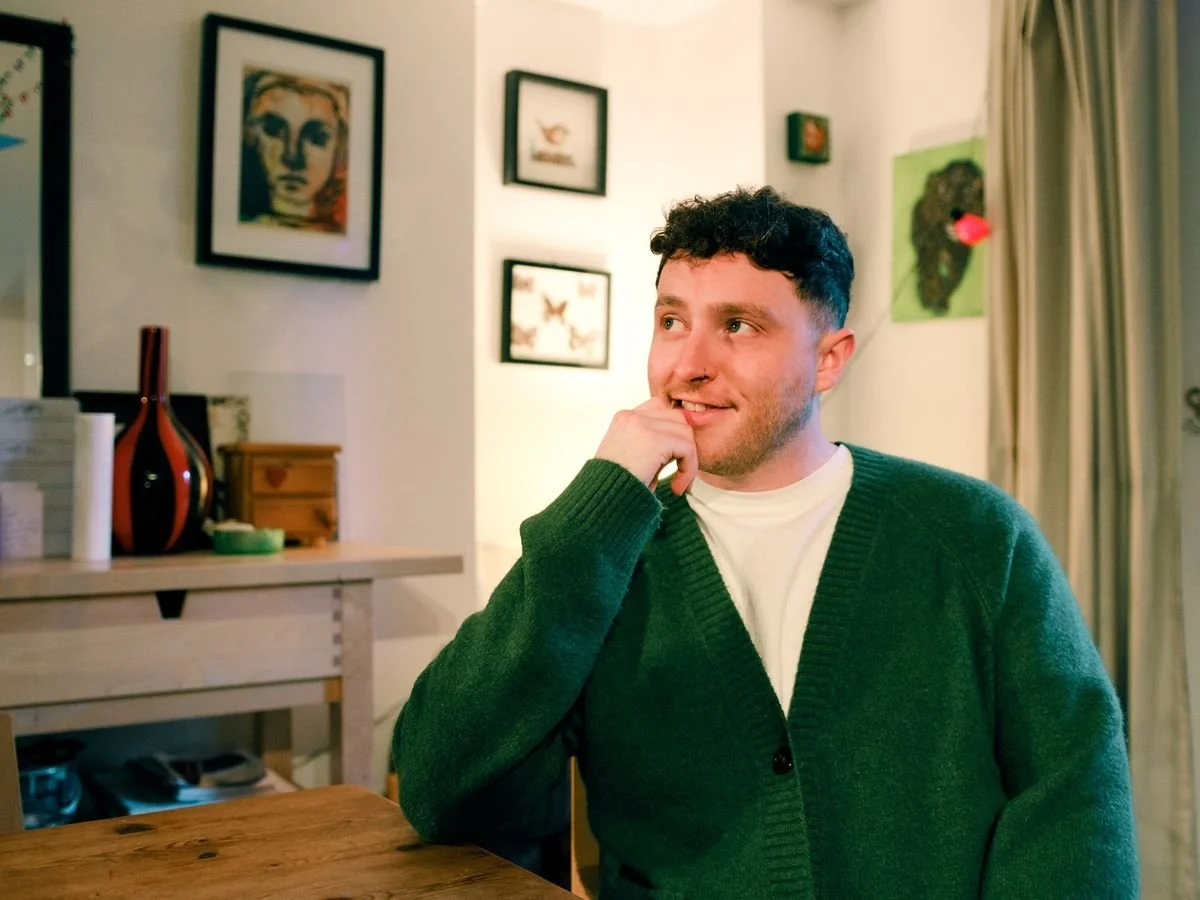(Don’t) Stop Filming me Courtney: Paul Black on Virality, Class, and all things Glasgow
Written and Interviewed by Charlotte Lewis
When Paul Black speaks, it’s as if Glasgow itself has picked up the mic: fast, self-aware, and never quite willing to take itself too seriously. He’s the kind of performer whose offhand catchphrases end up tattooed on fans, whose earliest “punk edits” on Tumblr made him internet-famous before he even showed his face, and whose Glaswegian humour now pulls in thousands who see their own lives reflected in his work. In conversation, Black moves between razor-sharp wit and moments of sincerity, weighing the chaos of viral fame against the realities of being a working-class artist from his home city.
Image - What’s On Glasgow
Rather than start with childhood dreams or film school, he begins with a memory. “Teenage Glasgow was a JD drawstring bag,” he grins. “I’d swing it over my shoulder, head to the pool on my Young Scot card, then straight to the Encore Café for chips.” The sound of splashes, the smell of fryer steam, it’s more than background colour. It’s the foundation of his comedy: small, lived-in moments where authenticity thrives.
His accent is the thread running through everything. Online, people latch onto it, adoring it, imitating it (often badly), or mocking it. Paul mentions he loves talking about his home city, his friends from neighbouring towns tease him too: “We get it, you’re from Glasgow!”. But, in an era where brands try and fail to bottle working-class Glaswegian humour, Black’s comedy rings true because it’s lived. “A random woman in Glasgow is funnier than most professional comedians,” he laughs, and he’s not wrong.
Failure, or at least the risk of it, defined his breakout. One video, he and his brother filmed the throwaway line: “Stop filming me, Courtney!” He never expected it to stick. But the phrase went viral, spreading across platforms, and eventually appeared inked on a stranger’s arm. “That’s when I thought, right, the internet really is wild,” he laughs.
Yet virality brought labels he couldn’t shake. Despite studying film, writing pilots, and working in TV, he was suddenly reduced to “that TikTok guy.” The pigeonholing stung, but nothing hit harder than a commenter who accused him of being “secretly middle class” because his dad was a preacher. He laughs and notes sarcastically, “That one hurt. Call me cringe, call me weird, but don’t call me middle-class.” Paul isn’t shy about criticism. “You have to surrender to the fact that maybe people won’t enjoy it. My friends actually keep a list of the funniest horrible comments people have made about me,” he laughs. There’s nothing like a group of Glasgow friends to keep you humble.
For Black, success has never been a single breakthrough but a series of sparks: selling out the Armadillo a year into stand-up, directing a TV pilot, then another, then another. Each milestone brought relief for a moment, before the next goal loomed. “I used to think: make a pilot, and I’ll be happy. Then it was: make a series. Now I just think: keep creating consistently, and that’s enough.”
That consistency is hard-won in freelance life. He’s candid about the lean months when work dries up and rent looms. But he sees the quiet stretches as part of the cycle.
You may also know Paul from Who Agrees, the hit podcast he co-hosts with best friend Kendra Macpherson. “At first, I wasn’t sure, because everyone has a podcast, it’s like social media” he admits. “Then I saw a TikTok about how people are so anti anyone doing things, so I thought, why not?” Three sold-out Fringe shows and a TRNSMT performance later, the gamble has paid off. The podcast not only introduced audiences to Macpherson, who’s since built her own following, but gave Black a natural foil. “It’s so easy with Kendra,” he says. “We’re best friends, it’s not two people thrown together. There’s no effort.”
If podcasting is low-pressure fun, directing his short film Govan Fair Queen was the opposite: nerve-racking, exhilarating, and star-studded. Working with Elaine C. Smith, Julie Wilson Nimmo, and Maureen Carr was surreal. “I asked Elaine so many questions she had to remind me, ‘Paul, you’re the director!’” he recalls. But what struck him most was the joy these veterans still carried for the craft. “They reminded me it’s not about fame or numbers, it’s about bringing characters to life.”
Gova Fair Queen - Image BBC - Link to watch
When asked about his heroes, his answer is instant: Limmy. Brian Limond’s absurd, surreal humour showed Black that you didn’t need to water yourself down to find an audience. “Limmy proved that trusting your instincts, even the strangest ones, can still connect.” He also nods to the theatre-trained performers who paved the way in Scottish TV and radio, proving that working-class voices could carry as much weight as any other.
Between big-picture reflections, we also chat about the sillier stuff. The song that takes him straight back to being thirteen? DJ Earworm’s 2009 United States of Pop mashup, a euphoric collage of “Just Dance,” “Poker Face,” “I Gotta Feeling.” His dream Big Brother housemate? “Kim Woodburn, three versions of her, all arguing with each other.” As for who today might be the next Katie Price, he shakes his head. “You can’t recreate that. Her weddings on ITV2, the tabloids, the glamour, it was a moment in time. Legendary. Unrepeatable.”
Perhaps the most telling moment comes when he’s asked to sum up his generation. He pauses, then offers a single word: “Stunted.” It speaks to the frustration of blocked potential, sky-high rents, shrinking budgets, the insecurity of gig work. But instead of despair, Black channels it into constant creation: a podcast one day, a script the next, a web series after that.
His philosophy is simple: embrace imperfection, stay curious, and keep telling the truth. He’s not chasing polished virality, but capturing rough edges, chlorine-soaked memories, the lift of an accent, the click of “record” on a phone, and letting audiences see themselves in it.
By the end, it’s clear why Paul Black’s appeal stretches far beyond Glasgow. His comedy isn’t just about jokes, it’s about belonging. Whether you’re in Govanhill or scrolling from New York, his work reminds you that amidst all the gloss of the internet, the funniest, most honest moments are the ones that feel most lived in.




